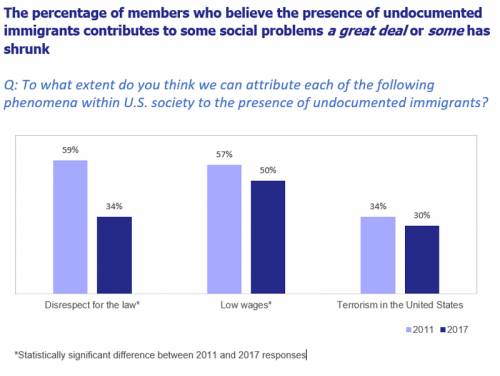Research Services finds biblical attitudes on immigration in latest survey results
by Melody K. Smith | Presbyterian News Service

Presbyterians are taking the biblical mandate to welcome the stranger more seriously than they did six years ago, a survey on immigration and refugees indicates.
LOUISVILLE —Presbyterians view immigrants more favorably than they did in 2011 and are more involved in immigrant ministries than they were in the past. These are the key findings of the May 2017 Presbyterian Panel survey on Immigration, Refugees, and Immigrant Ministries. The results were released earlier this month.
“These attitudes seem to reflect that Presbyterians take pretty seriously the biblical mandate to welcome the stranger,” said Susan Krehbiel, who works on refugee and asylum issues for Presbyterian Disaster Assistance.
The passage in Hebrews (13:2) urging Christians to welcome strangers is “very important” or “important” to how most members and ministers of the Word and Sacrament understand contemporary immigration and refugee issues, panelists’ responses show. The Hebrews passage reads: “Do not neglect to show hospitality to strangers, for by doing that some have entertained angels without knowing it.” (NRSV)
“It is also clear from survey responses that Presbyterians are skeptical about several recent immigration and refugee policy initiatives coming out of Congress and the administration,” said Dr. Perry Chang, sociologist and research associate.
The Presbyterian Panel is made of up of representative samples of ministers of the Word and Sacrament and members of Presbyterian Church (U.S.A.) congregations who respond to quarterly surveys on topics that are important to the denomination.
The August 2011 and May 2017 Panel surveys both dealt with immigration and immigrant ministries, and the inclusion of a number of identical questions in the two surveys allows for analysis of change over time. The Panel was re-sampled in fall 2011 and in 2015–16, so the panelists who participated in the 2017 survey were not the same panelists who participated in 2011.
“Presbyterians’ more favorable impression of immigrants is evident in the smaller number of Presbyterians who link undocumented immigrants with specific social problems,” Chang says.
The 2011 and 2017 surveys asked Presbyterians how much they believe the presence of undocumented immigrants is responsible for a list of social problems. There were three problems covered in both surveys: disrespect for the law, low wages and terrorism in the United States.

Presbyterians are also more involved than they were before in ministries with immigrants. This is the case both for PC(USA) worshiping communities and for individual Presbyterians.

Not only has worshiping community involvement in two of three activities with immigrants grown, but individuals’ involvement with one of the three (ESL classes) has also grown.

The increase in involvement with immigrant ministries also connects with the fact that Presbyterians continue to rate immigrant ministries as an important part of PC(USA) ministries.
Given Presbyterians’ more favorable view of immigrants and greater involvement in immigrant ministries, it should come as no surprise that few Presbyterians approve of several recent proposals to limit refugees and immigration. Even fewer ministers than members back the recent proposals.

“The results are encouraging, particularly given what appears is the current anti-immigration climate of the country,” says Lemuel Garcia-Arroyo, who coordinates the Presbyterian Mission Agency’s support for intercultural ministries and congregations of color.
More information about results to the immigration survey is available here.
![]() You may freely reuse and distribute this article in its entirety for non-commercial purposes in any medium. Please include author attribution, photography credits, and a link to the original article. This work is licensed under a Creative Commons Attribution-NonCommercial-NoDeratives 4.0 International License.
You may freely reuse and distribute this article in its entirety for non-commercial purposes in any medium. Please include author attribution, photography credits, and a link to the original article. This work is licensed under a Creative Commons Attribution-NonCommercial-NoDeratives 4.0 International License.
Categories: Communication
Tags: immigrant services, immigration, presbyterian mission agency, presbyterian panel survey, refugees, research services
Ministries: Research Services